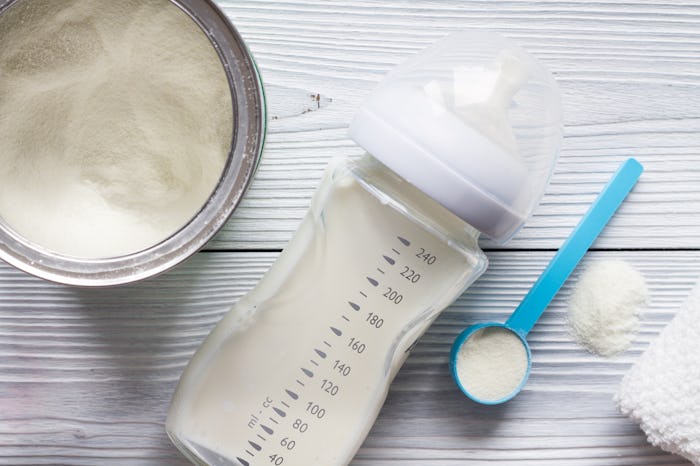Life

Is It Safe To Transition a Breastfed Baby To Formula?
If you find yourself in the position where you need to stop breastfeeding, for any reason, you may have questions and concerns. Is it safe to transition a breastfed baby to formula? If so, how do you do it? Can you mix milk? Is there a formula that is best for weaned babies?
It can be heartbreaking for a mother who needs to wean her baby from the breast because it's so easy to get swept up in the "breast is best" media and torture yourself with it. It can be devastating to know that you can no longer feed your child in the way you originally chose, and it's OK to feel that way — it's OK to mourn that experience. Whatever the reason you need to or are choosing to stop is yours alone, and rest assured you're doing the right thing for you and your baby.
Because you should know that it can also be liberating. Some mothers simply don't like breastfeeding, and that's OK, too. You may have sworn up and down during your pregnancy that you were going all the way with your boobs, and then you found it wasn't for you. Some mothers may need to travel for work, and it's cumbersome, some women go back to work, or their baby has a latch issue, requiring them to pump, and they hate pumping. This is also completely OK. So is it safe to transition a breastfed baby to formula?
It's not only safe, sometimes, it's absolutely essential. Is it easy? That depends. If you need to stop because your baby isn't getting enough nutrition, or they have a poor latch, or because they are allergic to breast milk, the wean will be easier, because your baby will be more sated, according to an article in The Lancet.
However, if you're weaning for reasons unrelated to infant comfort, health, and satiety, your baby may balk a bit. Consider this— you've been drinking out of the same water bottle every day for a year. You know the shape of the bottle, the way the aluminum makes the water taste, and the spout is perfect. Suddenly, you're given a new water bottle. It's still a great water bottle, but the water tastes differently, and you've haven't mastered drinking from it on the treadmill. It's annoying, but you soldier through, and get used to it. Babies have the same learning curve.
Be prepared to experiment with formula for your baby as not all babies react the same way to all formulas, too. Some formulas may cause a bit more constipation than others, according to Kelly Mom, and some may cause or exacerbate reflux, noted the website Dr. Sears.
If you're weaning, or simply supplementing, La Leche League International suggested that you combine your breast milk with formula in the same bottle. It's also OK to combine breastfeeding and bottle feeding until you're ready if there's no health-related reason to stop breastfeeding. Parents may also find that getting their exclusively breastfed baby interested in a bottle might take some trial and error with the right bottle and nipple combo, according to popular breastfeeding website The Leaky Boob. Because each woman's anatomy is different, as is each infant's, it's difficult to determine what sort of bottle your baby will prefer.
As for what to feed your baby, the American Academy of Pediatrics found there is no one perfect formula for all babies, or one perfect way to feed your baby. There are tons of varieties of formula out there, from pre-prepared to powdered, to pre-filled, pre-prepared bottles. What is safest, and what your baby likes, is what is best for you and your baby. Talk to your child's pediatrician for more information on finding a brand that's best for your little one.